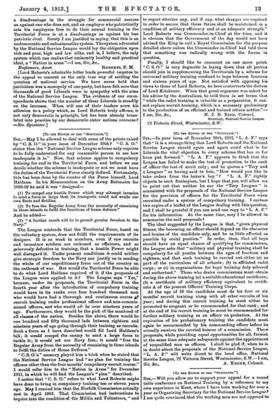[To THE EDITOR OF THE " SrrcrATott. - ] SIR,—In your issue
of December 28th, 1912, "L. A. F." says that" it is a strange thing that Lord Roberts and the National Service League should again and again avoid what is for Liberals the vital objection to every scheme that has so far been put forward." "L. A. F." appears to think that the League has failed to make the test of promotion to the rank of officer the test of merit only ; and he quotes a "Tory and a Leaguer" as having said to him, "How would you like to take orders from the baker's boy" ? "L. A. F." rightly objects to such flunkeyisrn, but I hope that you will allow me to point out that neither he nor the "Tory Leaguer '• is acquainted with the proposals of the National Service League for the provision of officers for the Territorial Force when recruited under a system of compulsory training. I enclose two copies of a leaflet of the League dealing with this question, and I shall be grateful if you can send one copy to "L. A. F." for his information. At the same time, may I be allowed to summarize the said proposals ?
The ideal suggested by the League is that, "given physical fitness, the becoming an officer should depend on the character and brains of the candidate only, and be as little affected as possible by social position." In order, then, that all boys should have an equal chance of qualifying for commissions, the League asks that "military and physical training shall be compulsory for all youths between the ages of fourteen and eighteen, and that such training be carried out either (a) as part of the curriculum of all schools ; (b) in affiliated cadet corps ; or (c) in organizations for boys' training duly selected and authorized." Those who desire commissions must obtain during the above training (a) a suitable educational certificate; (b) a certificate of military efficiency equivalent to certifi- cate A of the present Officers' Training Corps.
At the age of 18 the candidate must do his four or six months' recruit training along with all other recruits of his year ; and during this recruit training he must either be promoted to sergeant or be recommended for that rank ; and at the end of his recruit training be must be recommended for further military training as an officer on probation. At the expiration of his probationary training the candidate must again be recommended by his commanding officer before he actually receives the coveted honour of a commission. These proposals, while providing equal opportunities for all, furnish at the same time adequate safeguards against the appointment of unqualified men as officers. I shall be glad if, when he is in doubt about the proposals of the National Service League, "L. A. F." will write direct to the bead office, National Service League, 72 Victoria Street, Westminster, S.W.—I am,






















































 Previous page
Previous page